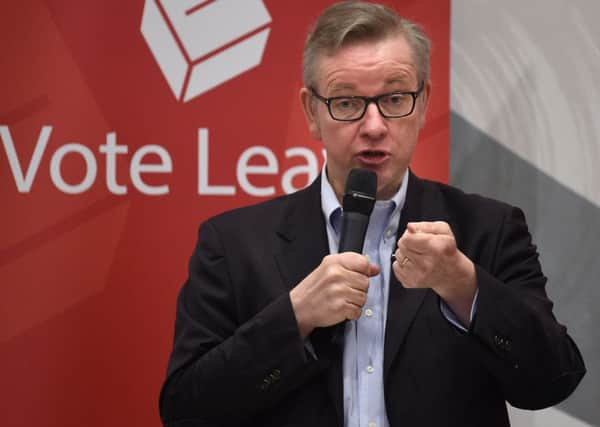William Wallace: The myths at the heart of Brexit campaign


Michael Gove’s recent declaration that he intends to support Brexit invoked a particular view of English history, of England as a naturally free country with a glorious past, facing a hostile and authoritarian continent: a Protestant and anti-Catholic myth in its origin, from the days when bonfires on November 5 burned the Pope, or Guy Fawkes as his agent.
Daniel Hannan MEP, one of the most effective campaigners for Brexit, published a book in 2013 updating Winston Churchill’s History of the English-speaking Peoples, entitled How we Invented Freedom: arguing that liberty and the rule of law are Anglo-Saxon concepts, which Spanish, French and German cultures still find it difficult to understand.
Advertisement
Hide AdAdvertisement
Hide AdHannan, like several of the passionate proponents of the incompatibility of English freedom with European cooperation, came to England from outside – in his case, Peru. Douglas Carswell, Ukip’s only MP, was born in Uganda. Arron Banks, who funds the ‘Leave’ campaign, insists that we have nothing in common with the people on the other side of the Channel, and should aim to be closer to ‘our kith and kin’ in the Commonwealth, like the white South Africa in which he spent his childhood.
In this clash over English history and identity, there is evidence all over Yorkshire of how – on the contrary – we have shared ideas and experience with our European neighbours. The Huguenot weavers and glass-makers, and the Moravians who helped to launch the 18th century Evangelical revival, have left their marks across the county.
In the wars of the 17th century, Protestant Dutch, Danish and French fought alongside English Protestants, while northern English Catholics were often on the other side. The ideas of the French Enlightenment fed into radical activists in northern cities, campaigning for political and social reform – campaigns bitterly resisted by the Tory establishment. Working class socialists in the industrial north learned from their counterparts in Belgium, France and Germany. The wave of Jewish refugees from Tsarist Russia revitalised both Yorkshire’s clothing industry and its cultural life.
In the Industrial Revolution, German ideas and immigrants flooded in. Civic universities like Leeds and Sheffield were founded on the German model; chambers of commerce set up technical institutes on German lines, with active encouragement from Prince Albert (of Saxe-Coburg-Gotha). Little Germany in Bradford is named after its large 19th century population of German entrepreneurs and engineers.
Advertisement
Hide AdAdvertisement
Hide AdBelgian refugees and wounded soldiers were housed in towns across Yorkshire between 1914 and 1918; and some stayed on and inter-married. Polish, Belgian and French pilots in the RAF were stationed across Yorkshire during the Second World War – their names recorded (with their Canadian and other counterparts) at the Yorkshire Air Museum. And many of the Poles who fought in the British army in that war settled here afterwards.
The idea that the European continent is populated by hostile foreigners, working to do Britain down, is the most absurd myth of the ‘Leave’ campaign.
They are also part of our kith and kin, as much as the Danes and Norsemen who populated much of Yorkshire and from whom our local dialects until recently derived. I walked past a 1950s fire poster in Salts Mill the other day, printed in Italian and Polish as well as English so that all the workforce understood it. Two generations of my wife’s family are buried between the Ukrainian and Polish sections of North Bierley cemetery. Their children and grandchildren are native Yorkshiremen like her.
The Brexit campaign nevertheless argues that we should leave Europe behind, to draw closer to our English-speaking cousins in North America and Australasia, even though American, Canadian and Australian leaders have urged us to stay closely engaged with our near neighbours across the Channel. The Russians and the Chinese would welcome Britain leaving, of course. But are these really our natural partners, the governments and peoples we most trust, with whom we share values and history? And would we prefer to share our future with them?
Lord Wallace of Saltaire is a Lib Dem peer.